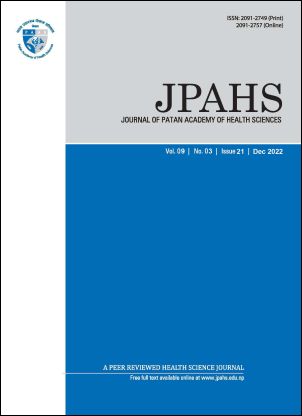Socio economic challenges and coping strategies against COVID-19 among dentists of Nepal
DOI:
https://doi.org/10.3126/jpahs.v9i3.52218Keywords:
COVID-19, Coping Mechanisms, Dentists, Financial ImpactAbstract
Introduction: COVID-19 has posed various challenges to health care professionals including dentists. We aimed to study financial impact, socio- economic challenges, coping strategies and areas where dentists of Nepal require support during the current pandemic.
Method: A descriptive study was conducted among registered dentists who were currently involved in clinical practice in Nepal. Data was collected via semi-structured online google form during the period of August – October 2020 through non-probability sampling. The online responses from google forms were transformed to datasheets which were analyzed using Microsoft Excel and summarized using descriptive statistics.
Result: More than a quarter (127, 29.8%) of the dentists were not able to practice dentistry during the pandemic. Among the salaried dentists, 113 (34.2%) of them did not receive any salary and 67 (15.7%) lost their jobs. More than 50% percent of decline in monthly income was experienced by 80 (18.7%). The most common challenge faced by the dentists was reduced income (95.2%) followed by access to PPE and sanitizers (72.9%). Social distancing was the most common (87.2%) coping strategy followed by strict use of PPE (86.9%), acquiring correct information regarding prevention of COVID-19 (76.8%). Provision of PPE was the area where 147 dentists needed the most support (36.4%) followed by cash allowance (31.7%) and rent waiver (28.4%).
Conclusion: The study showed that dentists in Nepal are facing serious financial challenges due to the current pandemic. The current study highlights a need to create a support system for dentists to sustain their clinical practice during the pandemic.
Downloads
Downloads
Published
How to Cite
Issue
Section
License
© Journal of Patan Academy of Health Sciences
Submission of the manuscript means that the authors agree to assign exclusive copyright to JPAHS. All authors must sign a Copyright Transfer and Author Agreement form upon submission of the manuscript to the Journal. The work shall not be published elsewhere in any language without the written consent of JPAHS. The articles published in this journal are protected by copyright which covers translation rights and the exclusive rights to reproduce and distribute all of the articles printed in the journal.




